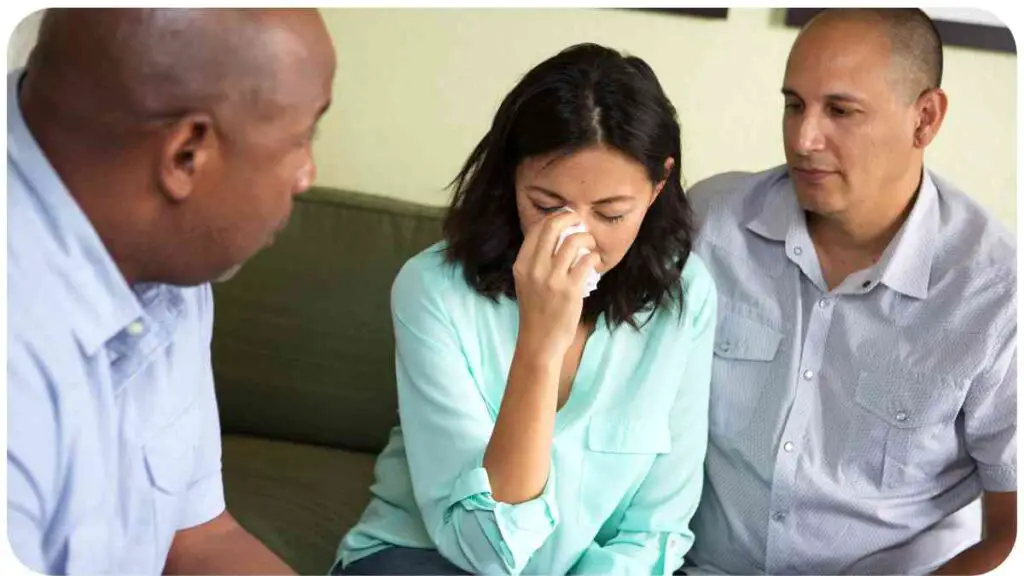Grief is a deeply personal and multifaceted emotion that accompanies the loss of a loved one or significant life change. It can be overwhelming, affecting every aspect of our lives. While grief is a natural response, sometimes it becomes difficult to navigate alone.
This is where grief counseling comes in. In this article, we will explore the benefits of grief counseling, the different types available, and how it can help you on your journey towards healing.
| Takeaways from “Grief Counseling: What Are the Benefits?” |
|---|
| Grief counseling provides a safe space for emotional expression and support. |
| Grief counselors help individuals develop coping mechanisms to navigate the grieving process effectively. |
| Professional guidance in grief counseling promotes healing and empowers individuals on their journey. |
| Grief counseling can assist in rebuilding a fulfilling life after the loss and promoting overall well-being. |
| Seeking grief counseling is a sign of strength and self-care, honoring one’s personal grief journey. |
What is Grief Counseling?
Grief counseling is a specialized form of therapy that aims to support individuals in dealing with the emotional, psychological, and physical challenges associated with grief.
It provides a safe and compassionate space where individuals can express their feelings, work through their grief, and develop coping mechanisms to navigate the grieving process.
Finding strength in community is crucial when coping with grief and loss. Through building a support system, you can discover the power of shared experiences and compassion, helping you heal during difficult times.
Understanding the Grieving Process
Grief is a unique experience for everyone, and the grieving process can differ from person to person. However, there are generally recognized stages of grief, including denial, anger, bargaining, depression, and acceptance. It is important to note that these stages are not linear, and individuals may move back and forth between them.
Benefits of Grief Counseling

Grief counseling offers numerous benefits that can greatly assist individuals in their healing journey. By seeking professional help, individuals gain access to a supportive environment where they can:
| Benefits of Grief Counseling |
| Explore and express emotions |
| Develop coping strategies |
| Obtain emotional support |
| Improve overall well-being |
| Gain a sense of empowerment |
Types of Grief Counseling
When it comes to grief counseling, there are various options available depending on individual preferences and needs. Some common types of grief counseling include:
The journey of grief becomes more bearable with a strong support system. Discover the significance of a support system during times of grief and how it can provide comfort, understanding, and hope in the midst of sorrow.
Individual Counseling
This type of counseling involves one-on-one sessions with a trained grief counselor. It provides a personalized and confidential space where individuals can discuss their feelings and work through their grief at their own pace.
Group Counseling
Group counseling involves a small group of individuals who have experienced similar losses coming together to support each other under the guidance of a counselor. Sharing experiences with others who can relate provides a sense of community and understanding.
Family Counseling
Family counseling focuses on supporting the entire family unit affected by the loss. It helps family members communicate, express emotions, and develop strategies to cope collectively. It can be particularly beneficial when children are grieving.
Online Counseling
With the advancements in technology, online counseling has become a convenient option for those who prefer remote access to grief counseling services. Online platforms provide a safe and accessible space to connect with qualified grief counselors.
Choosing the Right Grief Counselor
Finding the right grief counselor is essential for the effectiveness of the counseling process. Here are some factors to consider when selecting a grief counselor:
Qualifications and Experience
Look for a counselor who is qualified and experienced in grief counseling. They should have the necessary credentials and training to address the complexities of grief and loss.
Approach and Techniques
Different counselors may have different approaches and techniques they utilize in their counseling practice. Research and inquire about their therapeutic approach to ensure it aligns with your needs and preferences.
Compatibility and Trust
It is crucial to find a counselor with whom you feel comfortable and can develop a trusting relationship. This enables open and honest communication, which is vital in the counseling process.
What to Expect in Grief Counseling
Grief counseling is a collaborative process that involves various stages and activities. Here’s what you can expect during your sessions:
Initial Assessment
At the beginning of counseling, your grief counselor will conduct an initial assessment to understand your unique circumstances, emotional state, and specific needs. This assessment helps them tailor the counseling approach to best support you.
There are various ways to create a support system that can aid in the process of healing from grief and loss. Explore our comprehensive guide on 10 ways to build a support system to find practical strategies for finding the right support network for you.
Establishing Goals
During the early stages of counseling, you and your counselor will work together to establish goals and objectives. These goals are personalized to address your specific needs and guide the sessions.
Strategies and Techniques
Throughout the counseling process, your counselor will employ various strategies and techniques to help you navigate your grief. These may include cognitive-behavioral approaches, expressive therapies, relaxation techniques, and more.
Emotional Support
Grief counselors provide a safe space where you can freely express your emotions without judgment. They offer empathetic listening and emotional support, helping you process your feelings and experiences.
Coping Mechanisms
Grief counseling equips you with practical coping mechanisms to manage your grief and navigate the challenging emotions that arise. These coping mechanisms can assist you in finding healthy ways to cope with your loss.
Incorporating Self-Care into the Grieving Process

In addition to grief counseling, incorporating self-care practices can greatly support your healing journey. Taking care of yourself physically and emotionally is crucial during this challenging time. Here are some ways to prioritize self-care:
Taking Care of Your Physical Health
Engage in regular exercise, eat nutritious meals, and ensure you get enough rest. Physical well-being directly impacts your emotional well-being, and taking care of your body can contribute to a more balanced state of mind.
Prioritizing Emotional Well-being
Allow yourself to feel and process your emotions without judgment. Engage in activities that bring you joy and help you relax, such as practicing mindfulness, journaling, or engaging in creative outlets like art or music.
Seeking Support from Loved Ones
Lean on your support system of family and friends. Share your feelings and experiences with trusted individuals who can offer a listening ear and provide comfort during difficult times. Surrounding yourself with understanding and compassionate people can make a significant difference.
Engaging in Relaxation Techniques
Explore relaxation techniques that work for you, such as deep breathing exercises, meditation, or yoga. These practices can help reduce stress, promote relaxation, and provide moments of calm amidst the grief.
Real-life Success Stories from Grieving Individuals
Hearing stories of individuals who have found solace and healing through grief counseling can be inspiring and reassuring. Here are two real-life success stories that highlight the positive impact of grief counseling:
John’s Journey: Overcoming Loss through Grief Counseling
After losing his spouse in a tragic accident, John found himself struggling to cope with the immense grief and loneliness. Seeking guidance, he decided to try grief counseling.
Through the counseling sessions, John was able to express his emotions, share his memories, and work through his grief in a supportive environment. With the help of his counselor, he slowly found new ways to honor his spouse’s memory and rebuild his life while keeping their love alive in his heart.
Sarah’s Story: Finding Healing in Group Counseling
Sarah had experienced multiple losses in a short period, leaving her overwhelmed and emotionally drained. Seeking connection and understanding, she joined a grief counseling group. The group provided a safe space where Sarah could share her story, listen to others, and feel a sense of belonging.
She found comfort in knowing that she wasn’t alone in her grief and that others understood her pain. Over time, Sarah developed strong bonds with the group members, forming a support system that helped her navigate the complexities of grief.
Grief can be overwhelming, but you don’t have to face it alone. Learn how to reach out and build a support system that provides solace and understanding, helping you navigate the challenging emotions that come with loss.
Frequently Asked Questions about Grief Counseling
Here are answers to some common questions people often have about grief counseling:
How long does grief counseling typically last?
The duration of grief counseling varies depending on individual needs and progress. Some individuals may benefit from short-term counseling, while others may engage in longer-term therapy. The duration will be determined collaboratively with your counselor, based on your unique circumstances.
Is grief counseling only for recent losses?
No, grief counseling is not limited to recent losses. The grieving process can be complex and may persist for an extended period, even years after the loss. Grief counseling can be beneficial at any stage of the grieving process, regardless of when the loss occurred.
Can grief counseling help with complicated grief?
Yes, grief counseling can support individuals experiencing complicated grief, which is characterized by intense and prolonged symptoms. Grief counselors are trained to help clients navigate complex emotions and develop strategies to cope with the challenges associated with complicated grief.
How do I know if I need grief counseling?
Everyone’s grief journey is unique, and it’s a personal decision to seek grief counseling. If you find that your grief is significantly impacting your daily life, relationships, and overall well-being, or if you feel overwhelmed and unable to cope, it may be beneficial to explore grief counseling as a supportive option.
Conclusion
Grief counseling is a powerful tool that can provide much-needed support, guidance, and healing during the grieving process. It offers a safe space to express emotions, develop coping strategies, and find solace in the presence of a compassionate professional.
Remember, grief is a natural and individualized response, and seeking help is a sign of strength and self-care. Whether you choose individual, group, family, or online counseling, the goal is to honor your unique journey and find healing in your own time and way.
Reach out, embrace support, and allow yourself the opportunity to heal and grow through grief counseling.
Remember, you don’t have to navigate the grieving process alone. Reach out to a grief counselor, explore your options, and take proactive steps towards healing.
Creating a supportive network is essential for coping with grief and moving forward. Our guide on creating a supportive network after a loss offers valuable tips and strategies to ensure you have the right support in your journey of healing.
Further Reading
1. Grief Counseling: What Are the Benefits?
This article explores the benefits of grief counseling and how it can provide support during the grieving process. It discusses the importance of emotional expression, coping mechanisms, and guidance provided by grief counselors.
2. 3 Benefits of Grief Counseling
Learn about three key benefits of grief counseling in this informative article. It highlights the role of grief counseling in addressing complex emotions, rebuilding a life after loss, and promoting self-care and resilience.
3. How Grief Counseling Can Help You
Discover how grief counseling can provide invaluable support during the grieving process. This article outlines the benefits of seeking professional help, including emotional support, coping strategies, and the opportunity to honor your loved one’s memory.
FAQs
How do grief counselors support individuals through the grieving process?
Grief counselors offer emotional support, facilitating the exploration and expression of feelings, providing coping strategies, and guiding individuals to develop resilience in their grief journey.
Is grief counseling only for those experiencing the loss of a loved one?
While grief counseling is commonly associated with the loss of a loved one, it can also be beneficial for individuals grieving other significant life changes, such as a divorce, a job loss, or a health diagnosis.
Can grief counseling be helpful even if it has been months or years since the loss?
Yes, grief counseling can be helpful at any stage of the grieving process, regardless of the time that has passed since the loss. Grief counselors can provide support and guidance regardless of the duration of your grief.
If I’ve tried grief counseling in the past and it didn’t work for me, should I try again?
If a previous experience with grief counseling didn’t meet your needs, it can be worthwhile to try again with a different counselor. Finding the right fit is essential, as each counselor has a unique approach. Don’t hesitate to explore different options and seek a counselor with whom you feel comfortable.
Is grief counseling covered by insurance?
Insurance coverage for grief counseling can vary. It’s advisable to check with your insurance provider to understand the specifics of your coverage. Additionally, there may be community organizations that offer low-cost or free grief counseling services.

My name is Hellen James. I’m a grief and loss recovery expert who has helped people across the country to move beyond their grief and move forward with their lives.


